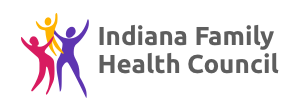Help for teenage
girls and boys
throughout Indiana.
Teen FAQs
Yes. People 17 and younger are eligible to receive all of our services as permitted by state and federal law. Costs are determined by the teenager’s income unless a parent or guardian is present.
Minors are always encouraged, but not required, to bring a parent or guardian when receiving care. Indiana Family Health Council encourages teens to speak openly with their parent/guardian about any activities that could potentially affect their health, including their sexual activities and healthcare choices.
All services and information shared during a visit are confidential and not shared with anyone, including a minor’s parent/guardian. However, the Indiana Family Health Council always encourages minors to talk to their parent/guardians about their healthcare choices and any activities that could affect their health.
Everything you share during your visit is private and confidential. The only exceptions are cases involving incest, abuse or rape of minors, which by law must be reported to the proper authorities. Positive test results for certain sexually transmitted infections must be reported to the state health department.
The first step is to come in to a Indiana Family Health Council funded clinic closest to you for a pregnancy test. If you are pregnant, clinic staff will help you find out if you are eligible for assistance programs and get you enrolled. Options counseling also is available. If you are not pregnant don’t want to start a family just yet, our staff can provide information on contraceptives.
We’re glad you want to learn more. In addition to speaking to one of our staff members at our clinics, you can find more information targeted to teens on our resource page.
Did You Know?
- Abstinence (not having sex) is the only method of birth control that is 100 percent effective.
- More than 750,000 teens become pregnant each year.
- Babies of young teen mothers are more likely to be born with serious health problems.
- A girl can get pregnant even if she is on her period.
- A girl can get pregnant even if a boy doesn’t ejaculate or “cum” inside her.
- A girl can get pregnant the first time she has sex.
- An estimated four in 10 sexually active adolescent females between the ages of 14 and 19 have an STD
- Sexually transmitted diseases (STDs) and sexually transmitted infections (STIs) may cause some extreme pain.
- Some STDs can be easily cured with antibiotics when caught early; others have no known cure but are treatable.
- Left untreated, some STDs can lead to infertility, pregnancy complications, organ damage, and even death.
- Teenagers can be treated for sexually transmitted infections without their parents’ permission.
- In 2006–2010, 86% of females aged 15–19 and 93% of their male counterparts reported having used contraceptives the last time they had sex.
- Teenagers can get birth control without parent consent in Indiana.

